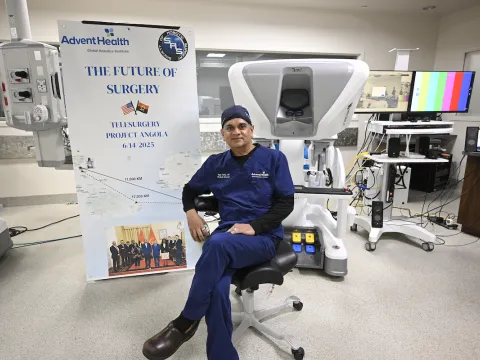- AdventHealth

This Physician's View opinion piece is written by Ademola Adewale, M.D., emergency medicine physician at AdventHealth East Orlando.
I’ve spent my entire career caring for strangers on their worst days. And during that time, I’ve watched my colleagues – fellow emergency medicine physicians and nurses – trudge through their worst days too.

The COVID-19 brought a lot of “worst days” to the hospital. And despite my experience, I was unprepared for the tsunami of emotions and stress triggered by the pandemic.
How could I possibly heal others when I didn’t feel whole myself? I couldn’t. It almost drove me out of medicine, after devoting 20 years of my life to the profession.
Suffering in silence
Though death is a reality, the wave of sadness, guilt and anger hits hard every time.
Throughout the pandemic, I saw how trying it was for, not only me, but for the entire clinical team. Throw in the added pressure of the emergency department, where every second counts and change is occurring at lightspeed pace, and it’s a code red for mental health.
The constantly changing COVID-19 environment and day-to-day pressures of the ER weighed heavily on my body, mind and spirit. I suffered from near mental exhaustion and almost burnout.

I met the criteria for colloquial depression, but managed the symptoms so my colleagues didn’t notice. I lost my purpose and suffered in silence.
After feeling emotionally drained and dissuaded, I started journaling. After a year, a pattern emerged that gave me a beacon of light.
Though whole-person medicine is integral to AdventHealth’s care philosophy, I realized that physicians, myself included, have to be whole ourselves. We can’t give what we don’t have
I began researching wholeness and whole-person medicine. Not only did it give me a better understanding of the concept, but it gave me hope.
I began to heal.
Transformation through wholeness
My journaling eventually evolved into writing my first book, Fully Alive: Experiencing the Five Pillars of Wholeness.
Writing this book gave me renewed purpose because I could help my fellow physicians and health care colleagues embark on their healing. This was a powerful motivator.
Q&A with Ademola Adewale, MD on His Personal Journey to Find Wholeness
While the book is applicable to anyone experiencing burnout, the first four chapters are written with the unique challenges facing clinicians in mind, in particular, the rigors of the job and the toll COVID-19 took on physicians and the nursing team.
Through research, I identified the five pillars of wholeness:
- Physical wholeness: maintaining a healthy quality of life without fatigue or stress
- Emotional wholeness: managing thoughts and feelings to prevent a negative impact on behavior
- Mental wholeness: realizing your unique abilities, successfully coping with the normal stresses of everyday life, working productively professionally and making meaningful contributions to the community
- Social wholeness: making and maintaining meaningful positive relationships and continuing regular contact with various people in our life
- Spiritual wholeness: experiencing and integrating meaning and purpose into our lives through a connectedness with self, others, art, music, literature, nature, or a power greater than oneself
As I applied these pillars personally, I was transformed.
For example, I recognized the negative consequences of sleeping only four to five hours each night. When I became diligent in sleeping eight hours a night, my mood and mental alertness transformed; my focus improved drastically, my interpersonal relationships started thriving and I became more emotionally stable.
However, the most eye-opening revelation was my struggle with social isolation. I lived in a bubble where my life revolved around my job and my family. This lack of socialization threw the balance of the five pillars off and left my social well-being nonexistent.
To restore my social wholeness, I started going to work functions and engaging with colleagues on a personal level. I also made sure to proactively schedule a coffee or tennis date with my colleagues, something I had never done before. I learned through taking action that I could develop and nurture new and meaningful relationships.
Overall, I found renewed clarity, increased energy and improved confidence in life.
Turning words into actions
My transformation began with introspection, and I encourage all physicians to also take this self-inventory.
It can be a humbling experience to admit when our life or relationships are imbalanced. But when we’re able to truly assess ourselves – much like we do a patient seeking care – we can diagnose, develop a treatment plan and set goals.
One aspect of this experience is the realization that this transformation isn’t just about me. Family, friends, colleagues and patients also benefit from my wholeness.
Patients trust that we’ll bring our best selves – body, mind and spirit – every time they seek our care.
I encourage you to explore wholeness and find ways to apply these learnings to your life and practice. You won’t regret it



